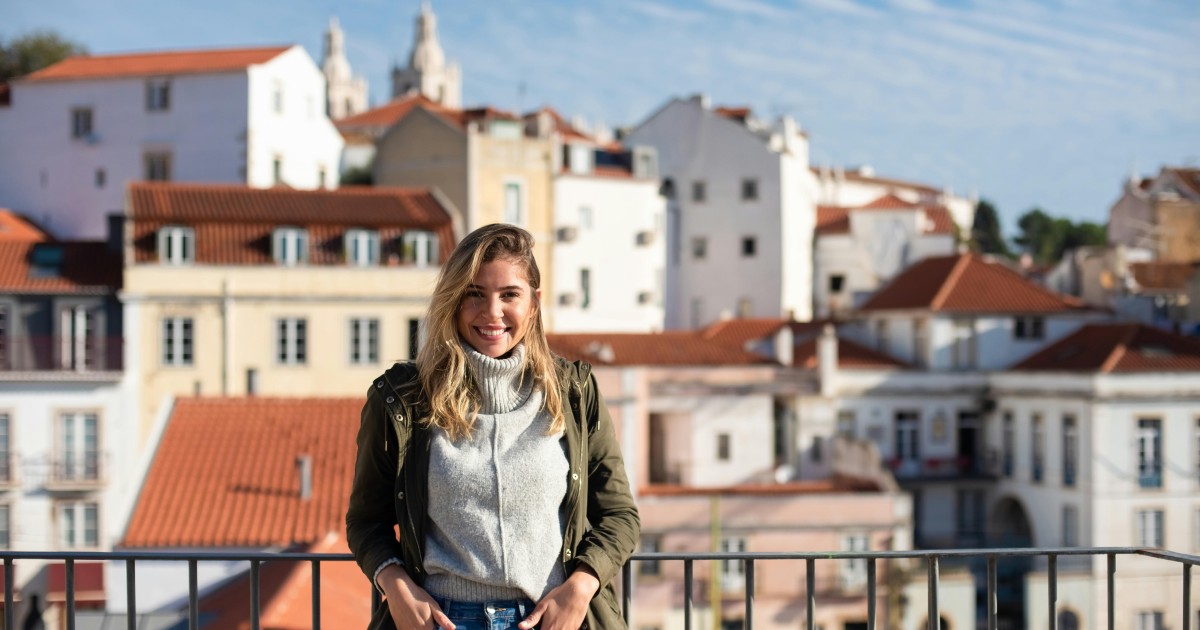Solo travelling is having a real moment, and Lisbon is right in the thick of it, thanks to being the sort of city that makes going it alone feel easy. Ranked 2nd globally for solo travellers by TUI Musement, Lisbon is welcoming, good value, and effortlessly social.
TUI Musement‘s ranking is based on reviews by solo travellers using criteria such as safety, cultural heritage, local nature, and the chance to connect with others.
Lisbon lands in second place globally with an average score of 9.03 out of 10, just behind Liverpool on 9.68. The rest of the top tier includes Bangkok (9.02), Vienna (9.00), Krabi (8.97) in Thailand, the Carpathians in Greece (8.96), Bali (8.93), Barcelona (8.87), Khao Lak (8.86), also in Thailand, and London (8.85).
TUI Musement’s verdict on Lisbon sums up the city’s pull neatly: “Lisbon captivates visitors with scenic viewpoints and easy access to charming towns such as Sintra, Cascais and Estoril.”
Lisbon boasts plenty of characteristics that solo travellers tend to prioritise. It has a compact, walkable core, solid transport for stress-free movement, and a warmly social culture that makes it simple to meet people without feeling pressured. It’s also pretty easy to go it alone and explore the many non-touristy things you can do in Lisbon when you’re on your own and flexible.
Safety scores and well-trodden visitor infrastructure help with confidence, while the mix of museums, street life, fado and coastal day trips keeps things varied enough for proper self-discovery without logistical faff. It’s no surprise that Lisbon was also recognised as the world’s happiest holiday destination in 2025.
Lisbon’s one of the easier European capitals to navigate on your own. Most bother is low‑level pickpocketing in busy spots and on classic routes like Tram 28, 15E and the Elevador da Glória.
Neighbourhood‑wise, there aren’t specific areas to avoid in Lisbon as such, but it’s good to be wary in some areas. Baixa/Chiado is bright and bustling, Alfama, Mouraria, and Graça are gorgeous but can feel quiet and steep after dark. Príncipe Real has a mellow, upscale buzz, and Parque das Nações feels modern and calm with wide, well‑lit promenades. Nights out in Bairro Alto and Cais do Sodré are lively and social, and if you’re feeling brave, it’s well worth going in search of Lisbon’s hidden, lesser-known spots.
Watching your drink, sticking to lit streets between bars, and hopping in a licensed taxi or an Uber/Bolt/Free Now when you’re flagging keeps things simple. Solo female travellers tend to pick stays near a metro stop or along well‑lit streets, with female‑only dorms and small‑group tours easy to find.
Aim for somewhere central and well connected so nights and early starts stay faff‑free.
Baixa and Chiado put you in the thick of cafés, tram stops and sights, with busy, well‑lit streets that feel easy after dark.
Around Marquês de Pombal and Avenida, you get fast Metro links and straightforward airport access, handy if you like structure.
Cais do Sodré is lively and next to the river and train station for Cascais, though you’ll want a place on a quieter side street.
If you prefer a slower feel, Alfama and Graça are scenic with postcard views and fado spots; they’re steep and can be quiet late, so being near a main road or quick taxi route helps.
Príncipe Real is polished and neighbourly, with good brunch spots and gardens.
Parque das Nações brings modern riverside paths, big‑windowed hotels and straightforward Red Line access to the airport.
Some solo travellers visiting the city end up living in Lisbon because day-to-day life is easy-going. The city’s broader appeal shows up in its highly-ranked quality of life in 2025, and you feel it in the little things like safe evening walks, local cafés that remember your order, and neighbourhood festas.
Stay inspired for your travels in Portugal —get our weekly newsletter for the latest travel, legal, and lifestyle news.
Portugal’s national trade unions have announced a general strike for Thursday, 11th December, the first time in 12 years. The stoppage is expected to have a nationwide scope, with disruption likely across transport networks, public administration, education, healthcare and municipal services.
Living in Faro means easing into the laid‑back capital of the Algarve, where a compact old town meets the lagoon. With a population of around 60,000, life feels refreshingly local. It’s sunny, walkable and well connected, with cafés, markets and a gentle year‑round buzz that’s easy to settle into.
Portugal consistently sits near the top of Europe’s league table for safe travel, and the 2026 ranking from Berkshire Hathaway Travel Protection confirms it: Portugal is comfortably within the top 15 safest countries worldwide to travel to.
According to Berkshire Hathaway Travel Protection’s 2026 traveller safety survey, Lisbon is in the top ten safest cities in the world. Noted as a secure, less congested alternative to other European cities, it has been recognised as one of the top ten safest cities to visit in 2026.
The Algarve once again confirmed its position as Portugal’s top tourist destination, welcoming 597,700 guests and 2.38 million overnight stays in September. According to the latest data from the National Institute of Statistics (INE), the region maintained a strong 27.9% share of all national overnight stays, reinforcing its dominance in Portuguese tourism.




